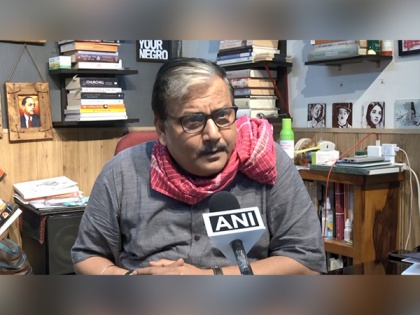"Important provisions of Articles 15, 16 were overlooked:" MP Manoj Jha on SC verdict over EWS reservations
By ANI | Published: November 8, 2022 05:37 PM2022-11-08T17:37:02+5:302022-11-08T23:10:13+5:30
The landmark ruling of the Supreme Court by a 3:2 majority, that upheld the constitutional validity of reservations to ...

"Important provisions of Articles 15, 16 were overlooked:" MP Manoj Jha on SC verdict over EWS reservations
The landmark ruling of the Supreme Court by a 3:2 majority, that upheld the constitutional validity of reservations to the Economically Weaker Sections (EWS) in educational and employment institutions, has led to a debate among political analysts with MP Manoj Jha calling it a factually deprived verdict.
Rashtriya Janta Dal (RJD) leader and Rajya Sabha MP Manoj Jha day after the verdict on Tuesday said that there were many things in the Supreme Court's decision regarding EWS quota, which should have been analyzed more deeply. "The architecture of our Constitution has many layers. Those layers were not seen. The pages of Article 15 and Article 16 were not viewed seriously. Also, there is an acute lack of scientific data, in the process of implementing EWS reservations," he said.
EWS reservation and Supreme Court's imprimatur to it invited MP Manoj Jha to draw it parallel to the provisions of 'Mandal Commission. "When the Mandal Commission came, it came with a complete database. It had primary data, secondary data, but, there is nothing in EWS," Rajya Sabha MP told ANI.
Demanding a caste-based census immediately, Manoj Jha said that the Supreme Court has given a split verdict. But, the Rashtriya Janata Dal directly believes that now Indira Sawhney (1992) and Balaji Judgment no longer matters. That means there is no question of ceiling now.
"Make reservation as much and ensure reservation in proportion to population by conducting caste census immediately," he added.
Manoj Jha also raised concerns on the representation of backward classes, such as OBCs, SCs, STs, in government-aided institutions. "Everywhere the participation of backward society is zero and this should be a matter of concern for any nation," he underlined.
RJD leader said that the limit of reservation can go as far as the population of the country.
"If you see even today, how much is the presence of 'Bahujan Samaj' in important institutions? how much is the presence of Dalits? Mahadalits or Adivasi Samaj? Start with the judiciary and move on to the important bodies of the executive. Everywhere the participation of backward society is zero and this should be a matter of concern for any nation. If you don't have this concern, then we suspect your concerns."
A five-judge Constitution bench of the apex court on Monday, in a majority judgment by 3:2, upheld the validity of the Constitution's 103rd Amendment Act 2019 saying EWS quota does not violate the basic structure of the Constitution.
However, Chief Justice of India UU Lalit, who retired today, and S Ravindra Bhat dissented on the majority verdict and struck down the 103rd Amendment Act.
The majority bench of Justices Dinesh Maheshwari, Bela Trivedi and JB Pardiwala by their three separate concurring judgments upheld the EWS Amendment.
Both Justice Trivedi and Justice Pardiwal appeared to suggest that reservation having roots in centuries-old social discrimination has lasted for long and it requires to be revisited and wither away.
Justice Trivedi said that what was sought to be achieved by reservation within 50 years of the advent of the Constitution has still not been achieved to this day.
Pronouncing judgment, Justice Maheshwari said that 10 per cent EWS reservation was an affirmative step and reservation exclusively on the grounds of economic backwardness.
During the hearing, lawyers appearing for petitioners submitted that the 103rd Amendment granted reservation to upper castes and this was a violation of the basic structure of the Indian Constitution.
It was contended by the lawyers of the petitioners that the quota on the economic ground alone is impermissible.
The petitions were filed in the top court in 2019, challenging the validity of the Constitution's 103rd Amendment Act 2019.
( With inputs from ANI )
Disclaimer: This post has been auto-published from an agency feed without any modifications to the text and has not been reviewed by an editor
Open in app